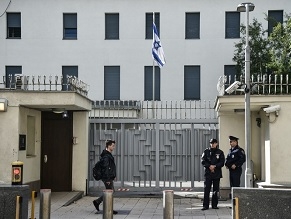|
Euroasian Jewish News

Russian police guard in front of the Israeli embassy in Moscow on September 18, 2018. (AFP / Vasily MAXIMOV)
|
Moscow embassy may go months without envoy, as PM keeps post in back pocket
27.11.2019, Russia Prime Minister Benjamin Netanyahu is reserving the post of ambassador to Russia for a political appointee, several diplomatic sources told The Times of Israel. Given the likelihood of new Knesset elections, this may mean that Israel’s embassy in Moscow will remain without a full-time head of mission for several months.
Israel’s last ambassador to Russia, Gary Koren, left in mid-September. His deputy, Keren Cohen Gat, headed the embassy until Yacov Livne, the director of the Foreign Ministry’s Eurasia department, arrived on November 8 and took over as temporary charge d’affaires.
Livne was born in Moscow and, after immigrating to Israel and entering the foreign service, served as spokesperson at Israel’s embassy in the city 25 years ago.
The Foreign Ministry decided to send Livne to Russia “to back up the embassy with a senior and experienced diplomat in light of the expected visit of Russia’s president in January 2020,” a spokesperson told The Times of Israel.
The Russian Embassy indicated the lack of ambassador would not dent ties.
“We will continue to cooperate with this experienced diplomat in order to further strengthen our bilateral relations,” a spokesperson told The Times of Israel. “It is [up to the] Israeli side to decide who will be a full-term representative.”
Livne is widely considered an experienced and very capable diplomat, but as charge d’affaires he is likely to have less access to Russian decision-makers than a full-time ambassador would have.
Israel sees Russia as a crucial bulwark against Iranian expansion on its northern border, after the US administration’s recent decision to withdraw nearly all its military forces from Syria. But Moscow’s alliances with Damascus and Tehran have worried Israeli officials and analysts, who fear the Kremlin may stop allowing Israel to carry out airstrikes in Syria.
Putin is scheduled to come to Jerusalem in late January to join other world leaders at a memorial commemorating the 75th anniversary of the liberation of the Auschwitz death camp.
In Israel, the Russian leader will also attend the unveiling of a monument honoring Soviet soldiers who fought and died in the siege of Leningrad.
According to a longstanding agreement between the Israeli government and the foreign service, the prime minister and the foreign minister have the prerogative to make a total of 11 political appointees.
However, during caretaker governments no political appointments can be made, and no career diplomat has been nominated for the Moscow position. According to diplomatic sources, the job was not advertised among diplomats, which strongly suggests that Netanyahu intends to wait until a new government is formed before tapping someone as new ambassador to Moscow.
In the likely scenario of new elections, this would probably not be before April or May.
The Prime Minister’s Office did not deny Netanyahu’s intention to reserve the job of ambassador to Russia for a political appointee, but did not further comment on The Times of Israel’s query regarding this matter.
Over the last few years, during many of which Netanyahu also held the foreign affairs portfolio, he has posted some of his allies to key embassies, including Ron Dermer (ambassador in Washington), Dani Dayan (consul-general in New York), Danny Danon (permanent representative to the United Nation in New York), Carmel Shamah Hacohen (permanent representative to UNESCO), Yossi Shelley (ambassador in Brazil), Dror Eydar (ambassador in Italy) and Ron Malka (ambassador in India).
The term of Israel’s ambassador to France, Aliza Bin Noun, recently expired, but she continues to serve in Paris.
Netanyahu has often stressed his close personal ties to Putin. They last met in Sochi on September 12, a few days before the last Knesset elections.
“Russian-Israeli ties stand out due to their meaningful political dialogue,” Putin said a few days after his last meeting with Netanyahu. “We often exchange views, have consultations over the phone, discuss current events, sometimes the most pressing issues on the global and regional agenda, and bilateral cooperation.”
By RAPHAEL AHREN
The Times of Israel
|
|
